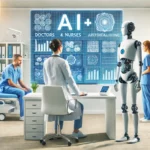A critical analysis of a study reveals that while AI may offer more empathetic and higher-quality responses to medical questions than physicians, limitations exist, warranting further research.
Main Points:
- AI’s Role in Healthcare: AI applications in healthcare are expanding, including diagnostics and real-time health monitoring, raising questions about its ability to outperform physicians in empathy and advice quality.
- Study Findings: In a comparison study, ChatGPT was rated as providing better quality answers and demonstrating more empathy than physicians for patient questions, with a significant difference in the length of responses.
- Research Limitations and Implications: The study faced limitations such as subjective criteria and incomplete blinding, suggesting the need for cautious interpretation of results and further research on AI’s accuracy and patient acceptance.
Summary:
The recent study suggesting that AI can provide more empathetic and higher quality medical advice than physicians has stirred both interest and skepticism. AI’s increasing integration into healthcare, from diagnosing diseases to monitoring vital signs, presents a compelling argument for its potential to enhance patient care. This study specifically examined the responses to patient questions by ChatGPT and volunteer physicians, with AI responses overwhelmingly favored for their quality and empathy. However, this research comes with significant caveats, including subjective assessment criteria and potential biases due to the noticeable difference in response lengths and identifiable AI communication patterns.
These findings prompt a reevaluation of AI’s role in healthcare, underscoring the importance of accuracy, patient safety, and professional oversight. While AI may offer insights into improving communication and empathy in patient interactions, it is clear that human supervision and verification are crucial to ensure the reliability and appropriateness of medical advice. The study’s limitations highlight the need for further, more rigorous research to explore AI’s capabilities and limitations fully. As we stand on the brink of a new era in healthcare technology, the balance between innovation and patient safety remains paramount, with ongoing research necessary to guide the integration of AI into medical practice responsibly.
Source: Can AI answer medical questions better than your doctor?
Keep up to date on the latest AI news and tools by subscribing to our weekly newsletter, or following up on Twitter and Facebook.







